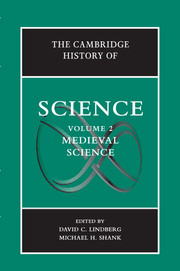Book contents
- Medieval Science
- Series page
- Medieval Science
- Copyright page
- Contents
- Illustrations
- Notes on Contributors
- General Editors' Preface
- Introduction
- 1 Islamic Culture and the Natural Sciences
- 2 Islamic Mathematics
- 3 THE MIXED MATHEMATICAL SCIENCES
- 4 Islamic Astronomy
- 5 MEDICINE IN MEDIEVAL ISLAM
- 6 Science in the Jewish Communities
- 7 SCIENCE IN THE BYZANTINE EMPIRE
- 8 Schools and Universities in Medieval Latin Science
- 9 The Organization of Knowledge
- 10 SCIENCE AND THE MEDIEVAL CHURCH
- 11 Natural Knowledge in the Early Middle Ages
- 12 Early-Medieval Cosmology, Astronomy, and Mathematics
- 13 EARLY-MEDIEVAL MEDICINE AND NATURAL SCIENCE
- 14 Translation and Transmission of Greek and Islamic Science to Latin Christendom
- 15 THE TWELFTH-CENTURY RENAISSANCE
- 16 MEDIEVAL ALCHEMY
- 17 Change and Motion
- 18 Cosmology
- 19 Astronomy and Astrology
- 20 THE SCIENCE OF LIGHT AND COLOR, SEEING AND KNOWING
- 21 Mathematics
- 22 Logic
- 23 GEOGRAPHY
- 24 Medieval Natural History
- 25 ANATOMY, PHYSIOLOGY, AND MEDICAL THEORY
- 26 Medical Practice
- 27 TECHNOLOGY AND SCIENCE
- Index
10 - SCIENCE AND THE MEDIEVAL CHURCH
Published online by Cambridge University Press: 05 September 2013
- Medieval Science
- Series page
- Medieval Science
- Copyright page
- Contents
- Illustrations
- Notes on Contributors
- General Editors' Preface
- Introduction
- 1 Islamic Culture and the Natural Sciences
- 2 Islamic Mathematics
- 3 THE MIXED MATHEMATICAL SCIENCES
- 4 Islamic Astronomy
- 5 MEDICINE IN MEDIEVAL ISLAM
- 6 Science in the Jewish Communities
- 7 SCIENCE IN THE BYZANTINE EMPIRE
- 8 Schools and Universities in Medieval Latin Science
- 9 The Organization of Knowledge
- 10 SCIENCE AND THE MEDIEVAL CHURCH
- 11 Natural Knowledge in the Early Middle Ages
- 12 Early-Medieval Cosmology, Astronomy, and Mathematics
- 13 EARLY-MEDIEVAL MEDICINE AND NATURAL SCIENCE
- 14 Translation and Transmission of Greek and Islamic Science to Latin Christendom
- 15 THE TWELFTH-CENTURY RENAISSANCE
- 16 MEDIEVAL ALCHEMY
- 17 Change and Motion
- 18 Cosmology
- 19 Astronomy and Astrology
- 20 THE SCIENCE OF LIGHT AND COLOR, SEEING AND KNOWING
- 21 Mathematics
- 22 Logic
- 23 GEOGRAPHY
- 24 Medieval Natural History
- 25 ANATOMY, PHYSIOLOGY, AND MEDICAL THEORY
- 26 Medical Practice
- 27 TECHNOLOGY AND SCIENCE
- Index
Summary
- Type
- Chapter
- Information
- The Cambridge History of Science , pp. 268 - 285Publisher: Cambridge University PressPrint publication year: 2013

